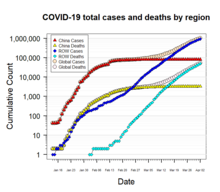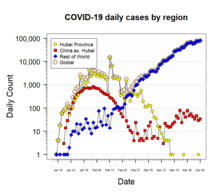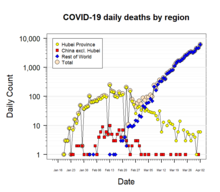Talk:Timeline of the COVID-19 pandemic in 2019/Archive 2
| This is an archive of past discussions about Timeline of the COVID-19 pandemic in 2019. Do not edit the contents of this page. If you wish to start a new discussion or revive an old one, please do so on the current talk page. |
| Archive 1 | Archive 2 |
Relevant discussion of sourcing
A discussion of studies of early SARS-CoV-2 identification in samples and standards of sourcing, particularly WP:MEDRS, is at Wikipedia talk:WikiProject Medicine#Does an article stating there is evidence SARS-CoV-2 was in the US in December fall under MEDRS or just RS?. There likely needs to be a stronger reliance on secondary scholarly sources rather than primary studies (especially preprints) and news stories about them, and more discussion of the strength of evidence. Fences&Windows 14:21, 16 December 2020 (UTC)
- Agree. We need good WP:MEDRS before we can confidently place something as a fact on a timeline. Alexbrn (talk) 14:24, 16 December 2020 (UTC)
Removed content due to MEDRS
|
|---|
|
The earliest confirmed coronavirus case with RT-PCR method was a four-year-old boy, in Milan, Italy, at the end of November 2019. The child, who had no reported travel history, was admitted to hospital with a cough and was suspected of having measles after showing symptoms that included vomiting, difficulty breathing and rashes. The biological material collected from his throat was frozen and stored at −80 °C (−112 °F) and later analyzed in a study published by the University of Milan confirming full identity to the Wuhan-sequenced virus (Wuhan-HU-1).[1][2] 18 DecemberThe Italian National Institute of Health looked at 40 sewage samples collected from wastewater treatment plants in northern Italy between October 2019 and February 2020. An analysis released in June 2020 said samples taken in Milan and Turin on 18 December showed the presence of SARS-CoV-2.[3]    References
|
- I've removed the recently published Milan case, I couldn't find a reliable medical secondary source. We need such sources to put the findings of primary studies in context. Fences&Windows 19:58, 16 December 2020 (UTC)
- I've removed the Italian sewage study, sourced to Reuters, and instead added a brief mention of these studies sourced to a recent review article. Fences&Windows 21:24, 16 December 2020 (UTC)
- This piece in The Conversation about another Italian study (a preprint) claiming a March 2019 detection explains well why its likely to not be accurate: https://theconversation.com/amp/was-coronavirus-really-in-europe-in-march-2019-141582. I'm not sure whether to include it. Fences&Windows 21:45, 16 December 2020 (UTC)
- I removed the plots of incidence, etc., as those date to January 2020 onwards so are not relevant to a 2019 timeline. Fences&Windows 21:28, 16 December 2020 (UTC)
- I added an edit notice about MEDRS, but there's an error message. Anyone know how to fix it? Fences&Windows 23:10, 16 December 2020 (UTC)
- Should be fixed now. Please ping me if any problems recur. --RexxS (talk) 14:50, 17 December 2020 (UTC)
Poorly-sourced content reverted
Albertaont has performed a large revert[1] to re-insert poorly-sourced material (including lay press, primary sources, and preprints), largely biomedical in nature, into the article. Albertaont - please see your Talk page for a notification about the sanctions in effect for this topic. With those in mind, I suggest you self-revert to avoid falling afoul of them. Alexbrn (talk) 17:19, 22 December 2020 (UTC)
- Hi, please break out your case for deletions as they relate to 4 unrelated segments. Then we can see which needs to be fixed within each of them. Your original deletion of "unreliable/undue" is not helpful and overly vague. Thanks Albertaont (talk) 17:26, 22 December 2020 (UTC)
- No, it was completely accurate. I have better thing to do than waste my time discussing crappy sources that you have inserted for no reason other than that you seem to want to have a long process of discussion. The WP:ONUS is on you to argue for content you want to include. Since you have restored legitimately challenged (and obviously unsuitable) content without consensus, I strongly suggest you self-revert before this gets escalated. Alexbrn (talk) 17:33, 22 December 2020 (UTC)
- Okay, I see Albertaont is not self-reverting but appealing for more eyes.[2] I am pinging RexxS and DMacks as administrators who have been actively considering how the COVID-19 sanctions might apply, to consider this case. Alexbrn (talk) 17:45, 22 December 2020 (UTC)
Restructure into one timeline
The section #Events, reactions and measures is repetitive of the rest of the content and how these events etc. are separated from the rest of the timeline is unclear. Unless there are objections, I'll combine the content into a single timeline. Fences&Windows 22:57, 22 December 2020 (UTC)
Tighter sanctions
It looks to me like we are having far too many edits that fail to meet WP:MEDRS, which I would expect to be the norm for an article focused on epidemiological issues.
I'm therefore considering strengthening the page-restrictions to require all epidemiological statements to be supported by a high-quality secondary source as required by MEDRS, and to ban completely the addition of preprints to the article.
The page restrictions were originally imposed by Fences and windows and their consent is essential to any modification. If there are no other compelling objections, I propose to amend the page-specific restrictions within the next couple of days. --RexxS (talk) 20:12, 22 December 2020 (UTC)
- I thought that was what the page restriction required: to follow MEDRS. Fences&Windows 21:09, 22 December 2020 (UTC)
- @Fences and windows: I had hoped that would be the effect, but it seems that
- All information added to this article must be supported by reliable sources (further information at WP:MEDRS) and presented from a neutral point of view
- is being interpreted as "it's okay to use anything that's a reliable source (subtext: even if it doesn't meet MEDRS)". I was wondering whether something like:
- All epidemiological content added to this article must be supported by sources deemed acceptable for medical content, as documented in WP:MEDRS
- No preprints may be used to source epidemiological content in this article
- Any challenged edits may not be reinstated in whole or in part before an agreed consensus has been reached on the talk page
- would be clearer? --RexxS (talk) 23:27, 22 December 2020 (UTC)
- It would spell it out, though many editors still read right past edit notices! Fences&Windows 00:51, 23 December 2020 (UTC)
- @Fences and windows: I had hoped that would be the effect, but it seems that
Covid cases in Milan in November 2019?
I don't know enough about the area to be confident to add this myself, but the following article claims that a Covid case occurred in northern Italy in November 2019: DOI:10.1111/bjd.19804 (accepted for publication in the British Journal of Dermatology). Maybe this should be added to the page? --Jochen (talk) 10:06, 12 January 2021 (UTC)
- Not reliable. See Talk:Severe acute respiratory syndrome coronavirus 2#Early Italian virus detection. Alexbrn (talk) 10:17, 12 January 2021 (UTC)
First Genetic sequencing COVID-19
Francis D'Souza CEO of Illumina writes in a science article that he was contacted in November 2019 to help sequence a NEW virus causing pneumonia in Wuhan. It was his machine that originally sequenced this virus in Wuhan by Zhang Yongzhen by January 5th 2020. Mr D' Souza's statement makes it clear that COVID-19 was known in Wuhan BEFORE the so called supposed index case of December. Extrapolating this data makes it clear that COVID was a problem by October/ November 2019 or even earlier, in Wuhan.
Signed Kochay1. — Preceding unsigned comment added by Kochay1 (talk • contribs) 00:16, 24 May 2021 (UTC)
This page is concealing information, which is a serious problem
The US state department and an intelligence report, as confirmed by the Wall Street Journal, both found evidence that the first three cases of this virus were from scientists at the Wuhan Institute of Virology in November 2019. The Biden administration is of course investigating it now as well. This page acts as though this information doesn't exist at all. It doesn't even list the information and describe it as disputed, so the reader can then investigate, it conceals it completely, so the reader never finds out in the first place. If anyone has or is deliberately removing it, they should have their editing ability blocked and their location and other editing activity should be investigated. Concealing true and relevant information, regardless of whether it's on behalf of a totalitarian government overseas or due to anger towards a domestic politician that first said it, should be treated with deadly seriousness by this site and any other reputable media or reference source. 72.79.76.198 (talk) 06:16, 29 May 2021 (UTC)
December 2019: Nature: Early warnings of COVID-19 outbreaks across Europe from social media, 2021-01-25
Here's an interesting article in Nature which states that there was an increased number of anomalous postings on twitter discussing dry cough and pneumonia. The analysis was for dates starting 2019-12-01. Worthy for inclusion? Chumpih. (talk) 22:15, 20 June 2021 (UTC)
Journal of Environmental Chemical Engineering: Sewage analysis
Why is this not considered WP:SECONDARY and therefore meeting WP:MEDRS? Chumpih. (talk) 11:13, 15 June 2021 (UTC)
A study of RT-PCR (Reverse transcription polymerase chain reaction) testing of untreated wastewater samples from Brazil and Italy suggests detection of SARS-CoV-2 as early as November and December 2019, respectively, but the methods of such sewage studies have not been optimised, many have not been peer reviewed, details are often missing, and there is a risk of false positives due to contamination or if only one gene target is detected.[1]
- See WP:MEDASSESS. We're looking for secondary sources like review articles (as are widely used throughout this article). Alexbrn (talk) 11:15, 15 June 2021 (UTC)
- Looking at the definition of secondary on WP:MEDRS we have "A secondary source summarizes one or more primary or secondary sources to provide an overview of current understanding of the topic, to make recommendations, or to combine results of several studies. Examples include literature reviews or systematic reviews found in medical journals, specialist academic or professional books, and medical guidelines or position statements published by major health organizations." (italics added). Would that not apply to the article here, given that it cites 99 source, makes recommendations, and appears in a reliable specialist publication? Chumpih. (talk) 11:50, 15 June 2021 (UTC)
- It is not classified by the publisher/PUBMED as a "review", and although the authors call it that, the primary purpose of their article seems to be to propose their own testing methodology. The problem with using what I shall call "the secondary bits in primary sources" is that they are there not give to an broad overview of the field (as is the case in genuine review articles), but picked to bolster the case for the research being proposed. This is why WP:MEDRS is as it is. Alexbrn (talk) 11:56, 15 June 2021 (UTC)
- It seems which aspects of WP:MEDRS apply is a moveable feast. Chumpih. (talk) 23:02, 4 July 2021 (UTC)
- It is not classified by the publisher/PUBMED as a "review", and although the authors call it that, the primary purpose of their article seems to be to propose their own testing methodology. The problem with using what I shall call "the secondary bits in primary sources" is that they are there not give to an broad overview of the field (as is the case in genuine review articles), but picked to bolster the case for the research being proposed. This is why WP:MEDRS is as it is. Alexbrn (talk) 11:56, 15 June 2021 (UTC)
- Looking at the definition of secondary on WP:MEDRS we have "A secondary source summarizes one or more primary or secondary sources to provide an overview of current understanding of the topic, to make recommendations, or to combine results of several studies. Examples include literature reviews or systematic reviews found in medical journals, specialist academic or professional books, and medical guidelines or position statements published by major health organizations." (italics added). Would that not apply to the article here, given that it cites 99 source, makes recommendations, and appears in a reliable specialist publication? Chumpih. (talk) 11:50, 15 June 2021 (UTC)
Clinical Infectious Diseases report on US
What's wrong with this? Chumpih. (talk) 07:16, 15 June 2021 (UTC)
A similar study was conducted on blood serum samples taken in several states in US between mid December 2019 and mid January 2020. The samples were taken by the American Red Cross. The study found evidence that suggests antibodies in samples from about 106 of the 7389 samples (1.4%) with some of those positive samples being taken between 13 and 16 December 2019. The report for the study suggests "that SARS-CoV-2 infections may have been present in the United States in December 2019, earlier than previously recognized." [1]
- Did you miss this?[3] Alexbrn (talk) 07:22, 15 June 2021 (UTC)
- @Alexbrn: No. There appears to be no previous discussion on the study on this talk page or the two archives. The words are backed up by a reference to a reputable journal. Chumpih. (talk) 07:31, 15 June 2021 (UTC)
- It's primary research failing WP:MEDRS, so unreliable. Alexbrn (talk) 10:28, 15 June 2021 (UTC)
- It's difficult not to be WP:POINTy here, given the majority of sources on this page are not Cochrane standard.Chumpih. (talk) 23:07, 4 July 2021 (UTC)
- It's primary research failing WP:MEDRS, so unreliable. Alexbrn (talk) 10:28, 15 June 2021 (UTC)
- @Alexbrn: No. There appears to be no previous discussion on the study on this talk page or the two archives. The words are backed up by a reference to a reputable journal. Chumpih. (talk) 07:31, 15 June 2021 (UTC)
Sewage water samples
A sewage water sample taken on 27th November 2019 in Brazil tested positive for SARS-CoV-2 in a PCR test. The study has been peer-reviewed. Should it be included? There are other examples of sewage water samples showing early cases. Mateussf (talk) 03:06, 13 July 2021 (UTC)
- Before long we're going to have such reports from every country! WP:MEDRS sources are needed for such things, and would need to agree the pandemic began earlier than thought. Alexbrn (talk) 05:41, 13 July 2021 (UTC)
- I believe the article could cite the reports, but not necessarily claim the virus was there based solely on those reports. But I confess I don't know much about how Wikipedia writes about medicine. Is it better to simply not address those reports unless they're scientific consensus? Mateussf (talk) 15:30, 13 July 2021 (UTC)
- Actually, as far as can be seen, WP:MEDRS does NOT cover history.Chumpih. (talk) 11:21, 10 September 2021 (UTC)
